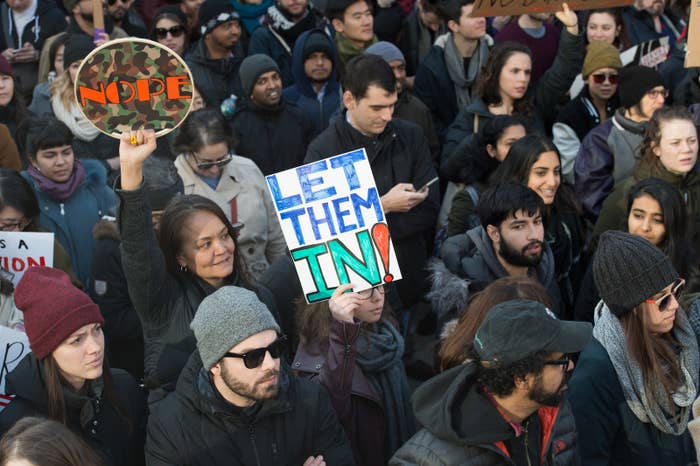
The Supreme Court will review President Trump's travel ban, the court announced on Monday morning.
In the meantime, the court allowed the federal government to implement the travel and refugee bans contained in Trump's March 6 executive order in part — against those without connections to people or groups in the US.
According to Justice Clarence Thomas, who would have allowed the travel ban to go into effect in full, the decision that the injunctions should, at least, be partially stayed was reached "unanimously."
The parts of the travel and refugee bans that Monday's order allows to be enforced will go into effect in 72 hours — should the administration adhere to the timeline laid out in a presidential memorandum Trump issued on June 14.
In a statement after the ruling, Trump said, "Today's unanimous Supreme Court decision is a clear victory for our national security. It allows the travel suspension for the six terror-prone countries and the refugee suspension to become largely effective."
The court's ruling came in a per curiam opinion — meaning for the court (and not in the name of an individual justice).
Earlier this year, district courts in Hawaii and Maryland issued injunctions against enforcing both the travel and refugee bands. The Justice Department appealed those rulings, and the Supreme Court granted the department's stay requests in part. That move narrows the lower court's injunctions, meaning that some parts of the travel ban may go into effect.
Justice Clarence Thomas, writing for himself and Justices Samuel Alito and Neil Gorsuch, would have stayed the injunctions "in full" — allowing full enforcement of the travel and refugee bans.
Although no vote count was announced, no justices wrote in dissent to say that they believed the injunctions should remain fully in effect.
Here's what the court said about the 90-day ban on travel from six Muslim-majority countries: "Section 2(c) may not be enforced against foreign nationals who have a credible claim of a bona fide relationship with a person or entity in the United States," the court stated. "All other foreign nationals are subject to the provisions of" the executive order signed by Trump.
In other words, if a person seeking an immigrant or nonimmigrant visa from one of the six affected countries has a genuine connection to people or groups already in the US — who could, potentially, assert their own rights — then they cannot be excluded under the ban. Determining people's connections to people and groups in the US likely will involve federal agencies' initial determinations and, ultimately, the courts.
Regarding the refugee ban, the court held that the same rule applies as to Section 6(a) — the 120-day halt to the refugee program.
The court noted that 6(b) — the 50,000-person cap on refugees — cannot be enforced as to refugees otherwise allowed in under Section 6(a). "[T]hat is, such a person may not be excluded pursuant to Section 6(b), even if the 50,000-person cap has been reached or exceeded," the court held.
